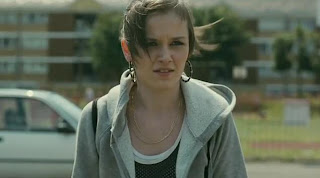Fish Tank
Fish Tank (2009)
Director: Andrea Arnold
Actors: Katie Jarvis, Michael Fassbender, Kierston Wareing

Synopsis: Mia (Katie Jarvis) is a 15-year-old living with her mum and younger sister in an impoverished Essex council estate. Between schools, she wiles away her time getting drunk, arguing with her mum, and entertaining vague dreams of being a dancer. When her mum brings home a handsome stranger, Conor (Michael Fassbender), Mia’s world changes dramatically.
Review: In terms of social analysis, Fish Tank is highly perceptive, and could quite easily be an informative tool in schools and social think-tank agencies for insight into the moral impoverishment of a certain type of British teenager. Director Andrea Arnold absolutely nails the gnarled world that main character Mia grows up in: by product of a neglectful and largely useless mother, a social strata awash in booze and deprived of the educational and fiscal means of social betterment, and a culture subtly corroded by television (Mia’s only inspirations are the rap and urban dance videos she sees on the TV which is perennially on in her flat). Arguably, Arnold’s greatest success is in realising this inner world of Mia, and how she’s trapped by the invisible ‘fish tank’ of those pre-mentioned restrictive circumstances. The sequences where Mia embarks on her private dance routines thematise that restriction, and it’s heartbreaking because she’s spilling out her soul, anger and yearnings in her moves, but, in essence, she’s not especially good because she’s had no formal coaching, nor encouragement from her mother, nor does she possess the necessary confidence and ‘softness’ to do proper justice to her aspirations.
It’s in Fish Tank‘s dramaturgy and stylistics that it threatens to come apart at the seams. Some of the scenes seem a little prescriptive and overly schematic (the girl abduction, and the completely incorrect ‘new start’ ending), and the film is often bathed in an unconvincing arthouse-lite glow – most notably in Mia’s totally clichéd empathy for the chained white horse she comes across. That said, the aesthetic of handheld cameras does lend us this sense that we’re viewing events from the perspective of Mia’s ever-growing, ever more frustrated point of view. (September 2013)